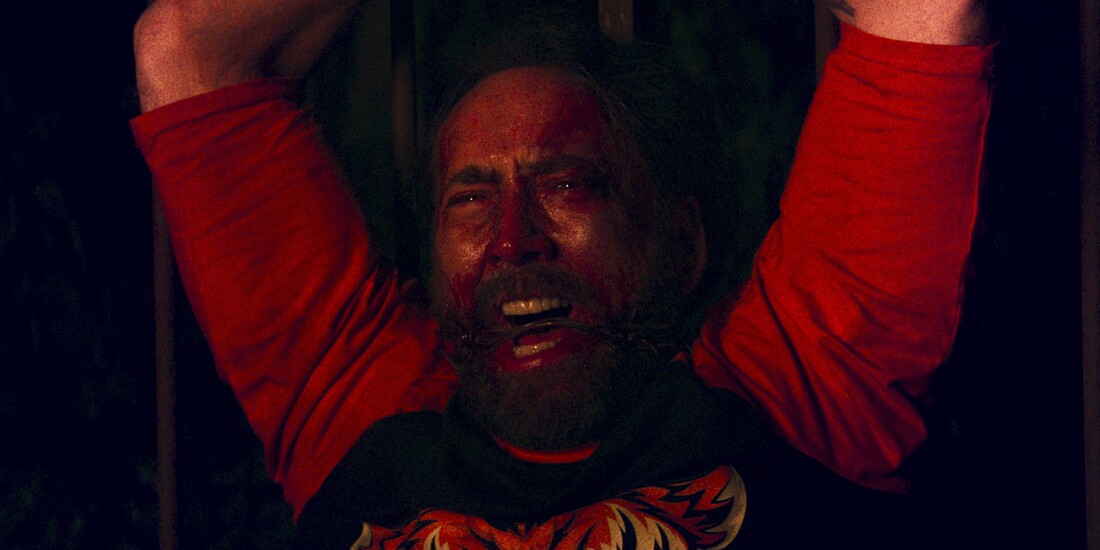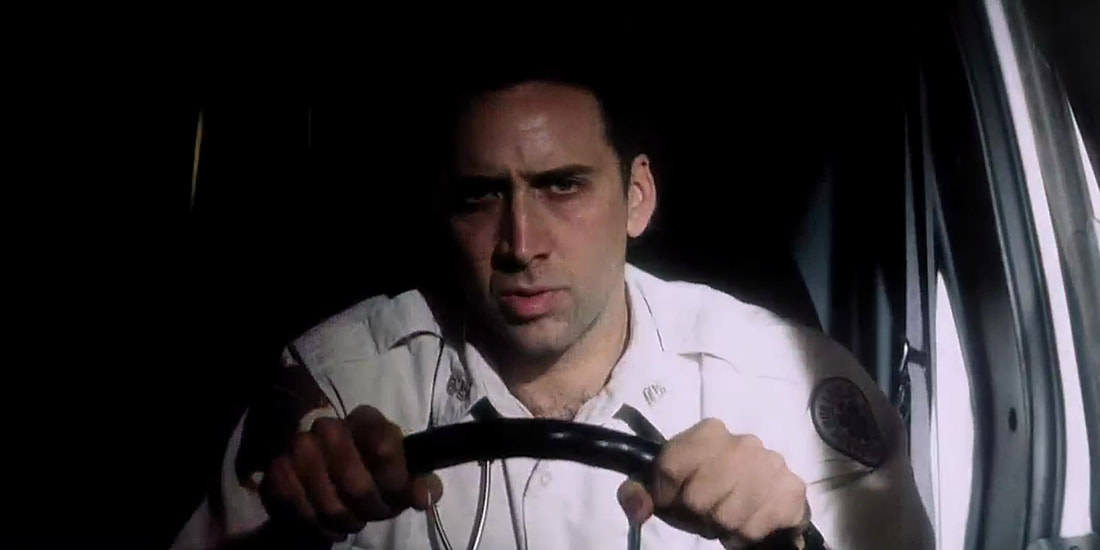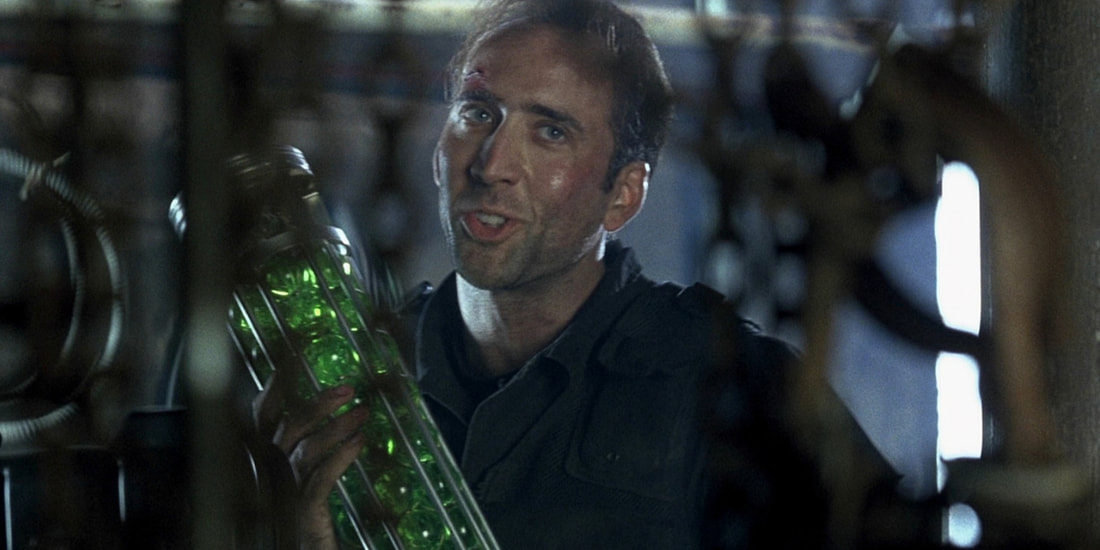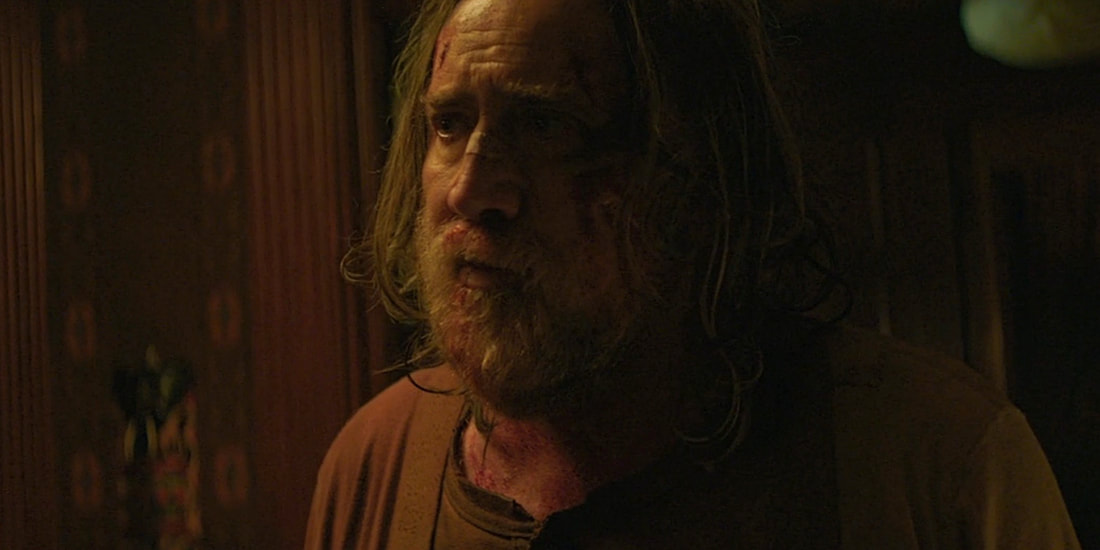There’s no one like Nicolas Cage. He’s a singular presence on the big screen; so extreme and uninhibited that you can barely take your eyes off him. His good is great, and his bad is the stuff that memes are made of. He’s also endured so many eras that there are different Cages to choose from. Do you prefer his quirky romantic films in the 1980s? His blockbuster run in the 1990s? What about his fascinating genre work in the early 2000s?
It’s impossible to provide all the necessary context for an actor who seemingly tosses out the rulebook with each new release. Still, we here at Next Best Picture are going to do our best to boil down Cage’s essence and display it through his ten best performances. Given the actor’s meta turn in “The Unbearable Weight Of Massive Talent,” there’s truly no better time. Let’s play “Low Rider,” get focused, and get to work (with respect to the “Gone In 60 Seconds” fans, despite the film not making our list).
10. “Red Rock West” (1993)

Cage has plenty of neo-noir films on his resume, but the first leg of his career saw him play second fiddle to trendier names. He chewed up the scenery in “Kiss of Death” (1995) and went nuclear in “Deadfall” (1993) with his most outlandish performance (seriously, look up clips on YouTube). “Red Rock West” was a chance for Cage to assume the role of the doomed protagonist, and he proved he could be just as compelling when it came to normalcy.
Well, semi-normalcy. Cage plays a drifter who agrees to murder a local woman (Laura Flynn Boyle) for cash, only to get caught up in a twisted game involving her husband (J.T. Walsh) and a deranged sheriff (Dennis Hopper). It’s a twisty nightmare, and director John Dahl perfectly uses Cage’s emotive, often fearful body language. He’s the only character who seems to grasp the lunacy around him.
PEAK CAGE MOMENT: A shirtless Cage doing push-ups in the middle of the highway. David Lynch must have been kicking himself for not including a similar scene in “Wild at Heart” (1990).
9. “Mandy” (2018)

The 2010s were not prime Cage years. The actor became a punchline for his seemingly endless stream of cheap action films, and the hope that he had some gas in the tank was all but gone. Then “Mandy” (2018) came along. The film, directed by Panos Cosmatos, is a simple revenge story told in the most psychedelic manner– a gorgeous gorefest that shimmers with the kind of lunacy that only Cage could evoke.
The actor plays a Midwestern loner whose wife (the titular Mandy) is killed by a local cult leader. He then plunges headfirst into the hellish world of the cult leader in the hopes of killing him and avenging the only person he ever loved. Words don’t do justice to the sensory rush “Mandy” provides, so you’ll just have to check it out on your own. What we will say is that Cage still has it.
PEAK CAGE MOMENT: A bloody Cage drinks vodka in his bathroom. His angry screams turn into pained wails. Did I mention he’s pantsless? This is the kind of scene a director only shoots when he has Cage at his disposal.
8. “Bringing Out The Dead” (1999)

After Cage’s action period came his auteur period, where he worked with exemplary directors on unique, frequently challenging stories, he made the interesting “Snake Eyes” (1998) with Brian de Palma and the underrated “8MM” (1999) with Joel Schumacher. Still, the highlight of the bunch was his collaboration with Martin Scorsese: “Bringing Out the Dead” (1999). He plays a spent paramedic who’s forced to work a hellish New York landscape over the course of three nights.
The film is bleak and unrelenting, which makes sense given the creative brain trust of Scorsese and screenwriter Paul Schrader. There are shades of the self-destructiveness and isolation of the duo’s previous films, but Cage manages to imbue the material with a shred of hopefulness. It’s the actor’s innate tenderness that distinguishes “Bringing Out the Dead” from its peers, and his tenderness that makes the film worth revisiting.
PEAK CAGE MOMENT: Cage’s delirious energy during his ride with Tom Sizemore. The blurred cityscape and the Ramones needle drop don’t hurt, either.
7. “The Rock” (1996)

The consensus with “Rain Man” (1988) is that Dustin Hoffman won the Oscar, but Tom Cruise actually gave the better performance. The rationale behind this stance is that Hoffman has one (memorable) note to play, while Cruise is tasked with changing over the course of the film. We would like to apply the same line of reasoning to “The Rock” (1996). Sean Connery is the bonafide badass, but Cage gives the better performance because he convincingly morphs from gawky scientist to hero.
Cage brings so much eccentricity to the blockbuster format that he basically redefined his career. His chemistry with Connery is electric, and his ability to sell ridiculous dialogue while serving as an avatar for the audience makes his performance all the more impressive. As with most of the entries on this list, nobody else could have done it.
PEAK CAGE MOMENT: Cage riffing on the Elton John song “Rocket Man” before shooting a rocket through a bad guy’s chest.
6. “Moonstruck” (1987)

Cage may have charmed in “Valley Girl” (1983) and delighted again in “Peggy Sue Got Married” (1986), but “Moonstruck” (1987) was his apex when it came to being a romantic lead. The film sees him play a hardheaded, one-handed baker who sweeps Loretta (Cher) off her feet. The only problem is that Loretta is engaged to his brother (Danny Aiello). Hijinx and heartbreak ensue, during which time director Norman Jewison lets the talent of his actors take center stage.
Cage turns up the New York accent to ten, and the unpredictability of his character makes his screen time genuinely thrilling. You could make the argument that his exaggerated performance feels at odds with the rest of the cast, but to do so would be to ignore the fact that his scenes with Cher are the best in the entire film. He somehow displays range while being wholeheartedly himself.
PEAK CAGE MOMENT: We all know the scene. A disheveled Cage lifts up his left arm, points to it, and shouts: “I lost my hand! I lost my bride!”
5. “Pig” (2021)

Nobody commits like Cage. “Pig” (2021) exemplifies this case in point. The indie drama follows a man (guess who) who goes on a vengeful mission to recover the truffle pig that was stolen from him. It sounds relatively similar to “Mandy,” but where that film emphasized violence and mayhem, “Pig” prefers melancholy and reflection. It’s one of the quietest performances Cage has ever turned in, and it’s gripping precisely because of its muted qualities.
The character has an almost preternatural focus in comparison to the shallow businessmen he encounters, and director Michael Sarnoski knows just how to calibrate the two to maximize their dramatic differences. Leave it to Cage to make the quest for a pig one of the most emotionally poignant character studies of the past half-decade.
PEAK CAGE MOMENT: Cage sits down with a fellow chef and methodically breaks down the chef’s artifice until he sees things his way. It’s mesmerizing.
4. “Face/Off” (1997)

What a wild freaking ride. Here’s a list of things Castor Troy (Cage) does in the first act of “Face/Off” (1997): shoots a child, dresses like a priest, headbangs to a choir, and plants a nuclear bomb. The energy is through the rough, but it’s when the character swaps faces with FBI agent Archer (John Travolta) that the film reaches transcendent levels of camp. John Woo whips out all his directing tricks, and the two actors have an absolute ball playing up each other’s signature quirks.
Travolta is a delight in the midst of his second golden age, but Cage wins the film on the back of his multifaceted performance. He’s playing a man who’s become his mortal enemy, and the actor gets a chance to express all of the confusion and pain that comes with this horrific scenario. The moments where he’s playing Archer, who then has to play as Troy, are so layered and dense, and yet he manages to cut right through them with an emotional sword. He truly is a master.
PEAK CAGE MOMENT: The opener, where he shows off his biblical headbanging. If you were to make a WTF compilation on Cage, this would be one of the first clips pulled.
3. “Adaptation” (2002)

Charlie Kaufman is a strange man who wrote a story about how strange it would be if there were two of him. “Adaptation” (2002) is a self-reflexive, semi-autobiographical meditation on the creative process and the pains that one can go through in the pursuit of something “true.” Cage plays Kaufman and his fictional twin brother Donald, and the result is one of the strangest films in the actor’s oeuvre (which is saying a lot).
Cage is pulling double duty for the bulk of the film, and the ways in which he’s able to find subtle differences in the neurosis of both Kaufman brothers is dazzling to witness. He’s able to create believable chemistry with himself while at the same time going toe-to-toe with Chris Cooper and Meryl Streep. He nabbed his second Oscar nomination here, and we hope it’s not his last.
PEAK CAGE MOMENT: Cage (and Cage) discussing how to kill people. Don’t worry; it’s for one of their scripts.
2. “Raising Arizona” (1987)

Cage is so perfectly suited to the black comedy of the Coen brothers that it’s a shame they only made one film together. To be fair, the trio hit a home run with their one film: “Raising Arizona” (1987). Cage plays an escaped convict who vows to make his wife (Holly Hunter) happy and resorts to stealing one of a set of quintuplets from a local bigwig. All is well (relatively) until the bigwig decides to send a bounty hunter after the couple.
“Raising Arizona” moves at a hundred miles an hour, and Cage never misses a step as the clueless yet goodhearted antihero. His comedic timing is infallible, and his ability to riff with Coen brothers regulars like Frances McDormand and John Goodman shows just how adaptable he is to any kind of genre. It’s nothing revelatory, but it may be his most likable performance in terms of execution.
PEAK CAGE MOMENT: Cage absolutely bungling his way through a diaper robbery. Never has there been such disregard for an armed man.
1. “Leaving Las Vegas” (1995)

Cage poured his heart into “Leaving Las Vegas,” and the aftertaste can still be noted today. He is utterly devastating as an alcoholic screenwriter who decides to drink himself to death amidst the sights and sounds of Sin City. He falls in love with a prostitute (Elisabeth Shue) along the way, but his commitment to his suicidal mission puts their relationship in a constant state of flux.
Director Mike Figgis approaches “Leaving Las Vegas” with tremendous empathy for both of his main characters, highlighting their self-destructiveness and the bad luck that’s befallen them. Then there’s Cage, who can package all of his different personas and talents into a single performance. We see Cage the lover, the hilarious partygoer, and the lost soul throughout the film’s runtime, and the result is one of the most worthy Best Actor wins in recent(ish) memory. It’s not an easy watch, but it’s an impactful one.
PEAK CAGE MOMENT: Cage trying (and failing) to hit on a woman at a bar. It goes from charming to embarrassing in record time, and the actor is admirably committed to the bit.
I may not have seen “The Unbearable Weight Of Massive Talent” yet but for those who have, do you think it deserves a spot on this top 10 list? What did you think of the movie overall? What are your favorite Nicolas Cage performances? Please let us know your thoughts in the comments section below or on our Twitter account.
You can follow Danilo and hear more of his thoughts on the Oscars and Film on Twitter at @DaniloSCastro


